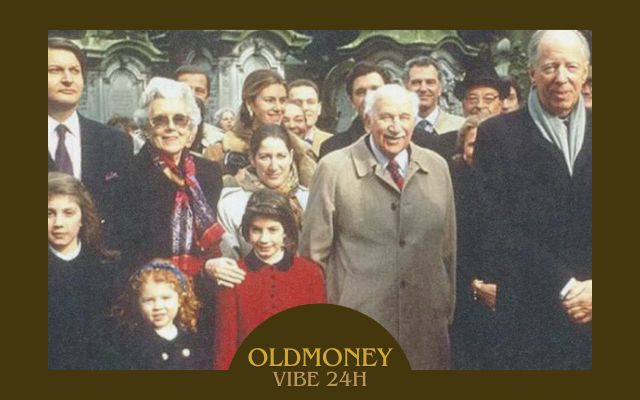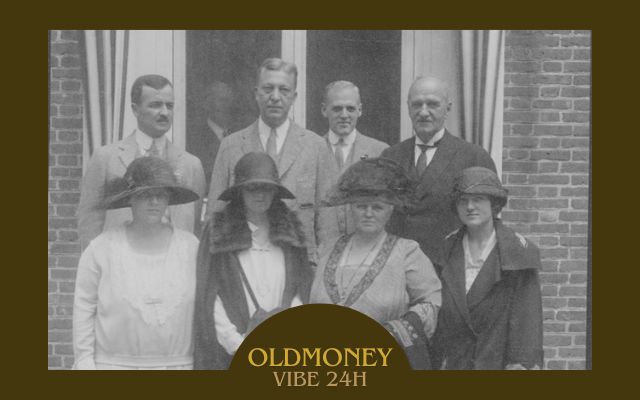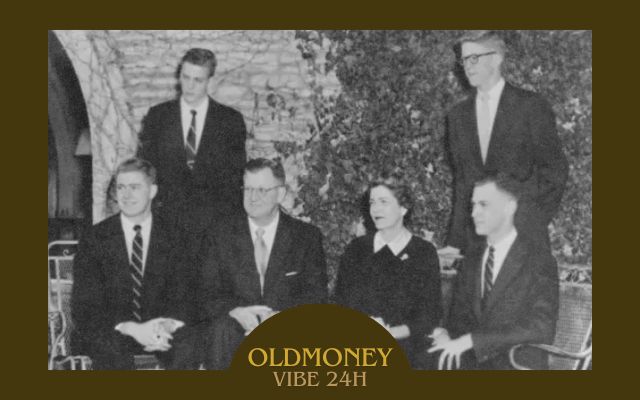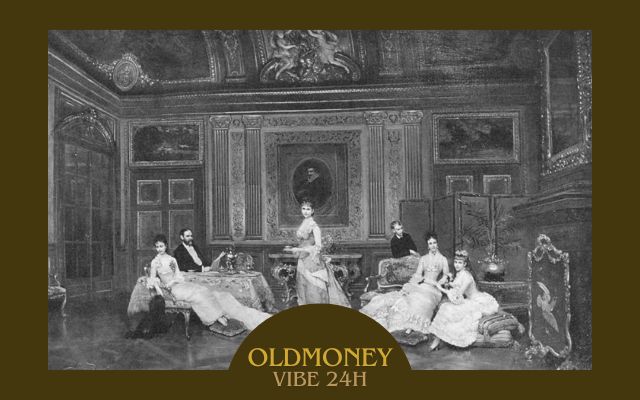Top 10 Old Money Last Names from the Most Wealthy Families
As someone enamored by the aura of old money, I find the surnames of the world’s wealthiest dynasties utterly captivating. These hallowed family names carry centuries of history, power, and prestige. From the aristocratic Rothschilds who dominated European banking to the industrialist Rockefellers who built an American oil empire, each syllable seems to drip with opulence and exclusivity. While fortunes ebb and flow, these iconic last names remain indelibly etched into the annals of the elite, representing a rarefied world of inherited affluence and societal influence that most can only imagine. Below is the top 10 ranking for old money last names by oldmoneyvibe24h. We hope you like it.

Rothschild
The Rothschild family, originating from Frankfurt, Germany, became prominent in banking and finance starting in the late 18th century. Founded by Mayer Amschel Rothschild, they quickly expanded their operations across Europe, establishing branches in key financial centers such as London, Paris, Vienna, and Naples.
Renowned for their shrewd financial strategies and adept navigation of international markets, the Rothschilds played a pivotal role in financing major infrastructure projects and government bonds, particularly during periods of conflict. Their success was bolstered by a decentralized business model, allowing each branch to operate semi-autonomously yet under a unified family strategy. This approach enabled them to capitalize on diverse economic opportunities across various countries and industries, including banking, mining, railways, and more. Beyond their financial achievements, the Rothschilds cultivated close relationships with royal families and governments, further solidifying their influence and prestige.
Their name has come to symbolize not only wealth and power but also a profound legacy in international finance and philanthropy. Today, being associated with the Rothschild name offers the potential for significant opportunities and connections in global finance and business circles, continuing to carry with it a legacy of influence and respect.
Rockefeller
The Rockefeller family stands as a cornerstone of American industrial history, catapulted to prominence by the visionary leadership of John D. Rockefeller. His founding of Standard Oil in 1870 marked the beginning of a transformative era in the oil industry, where strategic acquisitions and operational efficiencies swiftly secured Standard Oil’s position as the largest refining company globally. This success enabled the Rockefellers to diversify their investments into banking, real estate, and railways, solidifying their status as one of the wealthiest and most influential families in America.
Beyond their business prowess, the Rockefellers are celebrated for their profound impact on philanthropy. John D. Rockefeller’s commitment to giving back to society led to the establishment of numerous charitable foundations, most notably the Rockefeller Foundation. Dedicated to advancing public health, education, and scientific research worldwide, these philanthropic efforts have left an indelible mark on global development and social progress. The Rockefeller family’s influence extends far beyond their financial achievements. They played integral roles in shaping American institutions and urban landscapes, with notable contributions to the development of landmarks like Rockefeller Center in New York City.
Across generations, the Rockefeller name has come to symbolize not only vast wealth and power but also a legacy of social responsibility and leadership in philanthropy. Today, being associated with the Rockefeller name offers not only prestige but also access to extensive networks and opportunities in business, finance, and philanthropy. Their enduring legacy continues to inspire and drive positive change, making the Rockefeller family synonymous with both success and significant societal impact in American history.
Du Pont

The Du Pont family has left an indelible mark on American industry, notably in chemicals and manufacturing. Founded by Pierre Samuel du Pont de Nemours in the early 19th century, the Du Pont company initially focused on gunpowder production before expanding into diverse chemical products and materials. Pierre Samuel’s visionary leadership paved the way for DuPont to become a pioneering force in industrial innovation, shaping advancements in materials science that have influenced sectors ranging from agriculture to electronics and beyond.
Alongside their business achievements, the Du Pont family has made significant contributions to philanthropy and civic engagement. They have generously supported educational institutions, cultural initiatives, and community development projects, reflecting a deep commitment to social responsibility and community betterment.
Carrying the Du Pont name continues to signify not only a legacy of entrepreneurial vision and technological advancement but also access to influential networks and opportunities in global markets. The family’s enduring impact underscores their role as trailblazers in American industry, champions of innovation, and stalwarts of community support.
Morgan
The Morgan family is synonymous with the rise of modern finance and investment banking in the United States. The family’s legacy began with Junius Spencer Morgan, who established J.S. Morgan & Co. in the mid-19th century. His son, John Pierpont Morgan, known as J.P. Morgan, would become one of the most influential financiers of his time, consolidating power through strategic banking mergers and investments. J.P. Morgan’s firm, later known as J.P. Morgan & Co., played a pivotal role in financing major industrial consolidations and infrastructure projects, such as the creation of General Electric and U.S. Steel. His reputation for financial acumen and deal-making prowess earned him the moniker “The Napoleon of Wall Street.”
Beyond banking, the Morgan family’s influence extended into philanthropy and cultural patronage. J.P. Morgan Jr., known as Jack Morgan, continued his father’s legacy of philanthropy by supporting education, arts, and historical preservation. The family’s contributions helped establish institutions like the Morgan Library & Museum in New York City.
The Morgan name remains associated with wealth, power, and financial leadership. It symbolizes a legacy of innovation in banking and finance, as well as a commitment to philanthropy and cultural enrichment. Being connected to the Morgan family legacy offers not only prestige but also access to influential networks and opportunities in finance and philanthropy, continuing to shape the landscape of American business and culture.
Walton
The Walton family is best known for founding and building Walmart into one of the largest retail chains in the world. Sam Walton, along with his brother James “Bud” Walton, opened the first Walmart store in Rogers, Arkansas, in 1962. Their innovative approach to discount retailing, focusing on low prices and large selection, quickly resonated with American consumers and fueled the company’s rapid expansion. Under Sam Walton’s leadership, Walmart grew exponentially, expanding across the United States and eventually internationally.
The company’s success was driven by its efficient supply chain management, leveraging economies of scale to offer competitive prices and maintain profitability. The Walton family’s wealth soared alongside Walmart’s success, making them one of the wealthiest families in the world. They have diversified their investments into various sectors beyond retail, including real estate, hospitality, and philanthropy.
The Walton name represents not only immense wealth and entrepreneurial success but also a commitment to philanthropy and community impact. Being associated with the Walton family legacy offers opportunities for business partnerships, investments, and philanthropic collaborations, continuing to shape both the retail industry and societal initiatives globally.
Koch

The Koch family, led by brothers Charles and David Koch, is a prominent force in American business, politics, and philanthropy. Originating from their father Fred C. Koch’s engineering firm established in the 1920s, Koch Industries has grown into a diversified global enterprise with interests spanning refining, chemicals, energy, and commodities trading.
Charles and David have expanded Koch Industries through strategic acquisitions and a strong commitment to innovation, establishing themselves among the wealthiest individuals worldwide. Beyond their business achievements, the Koch brothers have actively promoted free-market principles and advocated for limited government through their philanthropic efforts.
The Koch family’s legacy encompasses not only their substantial wealth and business accomplishments but also their profound impact on shaping societal discourse and fostering opportunities aligned with their values. Being associated with the Koch family name offers access to influential networks, collaborative opportunities, and a dedication to advancing principles of free-market economics and civic engagement, both domestically and internationally.
Mars
The Mars family has significantly influenced the global consumer goods industry through Mars, Incorporated, established by Franklin Clarence Mars in 1911. Initially focused on candy production, the company has grown to encompass renowned brands such as Snickers, M&M’s, and Milky Way, setting the standard for quality and innovation in confectionery.
Successive generations of the Mars family expanded the company’s portfolio to include pet care products like Pedigree, Whiskas, and Iams, marking Mars, Incorporated as a leader in both confectionery and pet care markets worldwide.
Beyond business achievements, the Mars family is known for their philanthropic endeavors. Through the Mars Foundation and other initiatives, they support education, environmental conservation, and health initiatives, aiming to make a positive impact globally. The Mars family name represents not only entrepreneurial success and market leadership but also a commitment to sustainability and social responsibility. Being associated with the Mars family legacy offers opportunities for collaboration, investment in innovative consumer goods, and contributions to initiatives that prioritize environmental stewardship and societal well-being on a global scale.
Ford
The Ford family is synonymous with automotive innovation and entrepreneurship, particularly through the founding of Ford Motor Company by Henry Ford in 1903. Henry Ford’s pioneering use of assembly line production revolutionized the automotive industry, making cars more affordable and accessible.
The Ford name carries a legacy of innovation, manufacturing excellence, and industrial leadership. Beyond automobiles, the family’s influence extends into aviation, telecommunications, and philanthropy. The Ford Foundation, established in 1936 by Henry and Edsel Ford, has supported numerous initiatives in education, community development, and environmental conservation globally.
Being associated with the Ford family name represents a legacy of business success, innovation, and community service. It signifies opportunities for collaboration, investment in technological advancement, and contributions to societal well-being, continuing to shape the automotive industry and broader economic landscapes.
Gates
The Gates family, led by Bill Gates, co-founder of Microsoft Corporation, is synonymous with technological innovation, entrepreneurship, and philanthropy. Bill Gates and his wife Melinda have established the Bill & Melinda Gates Foundation, one of the world’s largest philanthropic organizations, dedicated to addressing global health, education, and poverty issues.
The Gates name signifies a legacy of transformative impact through technology and charitable giving. Beyond their achievements in the tech industry, the Gates family’s influence spans global health initiatives, educational advancements, and efforts to combat poverty worldwide. Their commitment to using wealth and influence for positive social change has made them influential figures in both business and philanthropy.
The Gates family name epitomizes a legacy of innovation, philanthropy, and global leadership. It symbolizes not only opportunities for collaboration and investment in cutting-edge technologies but also a steadfast commitment to improving lives globally through impactful initiatives in health, education, and poverty alleviation. Their influential role in both business and philanthropy continues to shape the future of technology and humanitarian efforts worldwide, leaving a profound and enduring impact on society.
Buffett
The Buffett family is synonymous with Warren Buffett, renowned globally as a highly successful investor and philanthropist. Warren Buffett amassed his wealth through strategic investments and acquisitions, primarily through Berkshire Hathaway, which he transformed into a diverse multinational conglomerate. The name “Buffett” signifies a legacy of financial wisdom, prudent investing, and long-term wealth creation. Warren Buffett’s philanthropic endeavors, including substantial contributions to the Bill & Melinda Gates Foundation, underscore his commitment to giving back and addressing global challenges.
The Buffett family name embodies a legacy of financial success and philanthropic leadership. It represents opportunities for responsible investment, wealth management, and making meaningful contributions to societal welfare and global issues. Warren Buffett’s enduring influence continues to shape the financial landscape and inspire future generations of investors and philanthropists worldwide.
Vanderbilt
The Vanderbilt surname has Dutch origins, tracing back to the 17th century when Jan Aertson, a farmer from the village of De Bilt near Utrecht, emigrated to the Dutch colony of New Netherland. His village’s name in the genitive case “van der Bilt” meaning “from the hill” or “from the mound” evolved into the surname Vanderbilt. The root “bilt” or “bult” refers to a low hill or mound in Dutch. So Vanderbilt is essentially a topographic surname describing someone who lived near a low hill or mound. When the English took control of New Amsterdam, the Dutch “van der Bilt” became anglicized to the modern spelling Vanderbilt.
The name gained immense wealth and prominence through Cornelius Vanderbilt, the 19th century shipping and railroad tycoon who established the famed Vanderbilt family dynasty. Though originally a modest descriptive surname, Vanderbilt became synonymous with vast inherited riches and elite American aristocracy during the Gilded Age.
Astor

The Astor family was one of the most prominent and wealthy families in the United States during the 19th and 20th centuries. Their immense fortune originated from John Jacob Astor (1763-1848), a German immigrant who made his wealth through the fur trade and strategic real estate investments in New York City.
The surname Astor has German origins, derived from the Occitan word “astor” meaning “goshawk” or a type of hawk. It was likely originally used as a nickname characterizing someone as predacious or hawk-like. The name was brought to southwestern Germany in the 17th century by Waldensian refugees from the Alpine valleys of northern Italy. So while the literal meaning refers to a bird of prey, the Astor name became synonymous with wealth, business acumen, and establishing a powerful American dynasty.
Although the Astor name literally translates to “hawk” from Old Occitan, it became inextricably linked to the family’s predatory business prowess in amassing one of the greatest fortunes in America’s Gilded Age. Their legacy lives on through the many New York landmarks, institutions, and aristocratic titles bearing the iconic Astor name.






